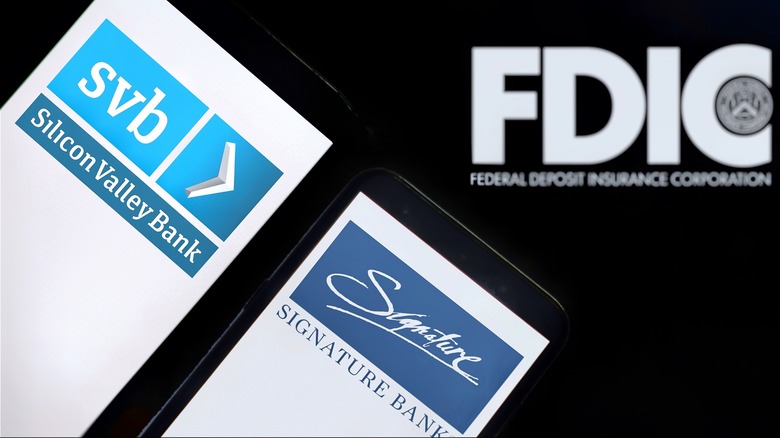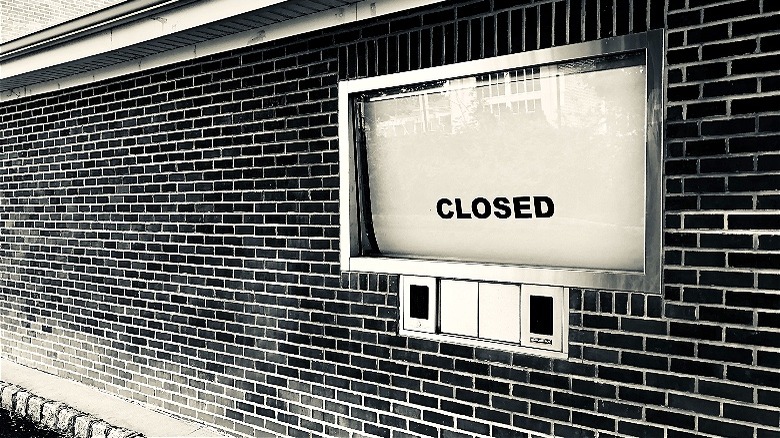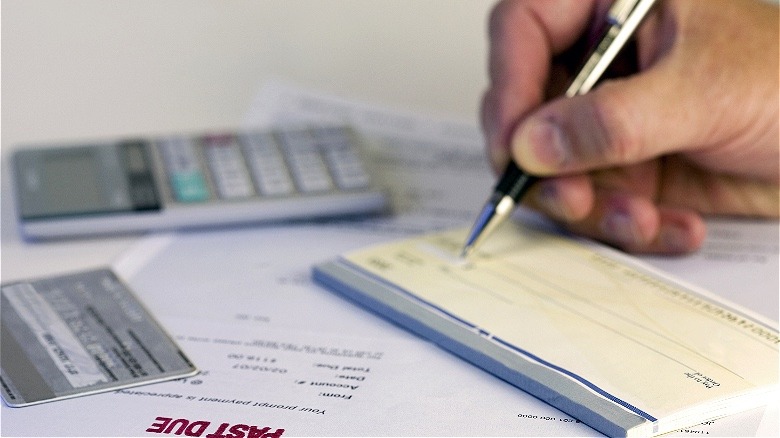What Really Happens When A Bank Fails?
There's no doubt that a bank's failure sounds super scary and intimidating; however, for the average depositor, it's likely to be a big nothingburger for your money. If your bank is insured by the Federal Deposit Insurance Corporation (FDIC) — and it's hard to find any modern banks in the United States that aren't — your deposits will be protected up to $250,000 per person in the event of a bank failure.
To be clear, that's $250,000 per person combined across all types of accounts. If you have a savings account, a checking account, and a certificate of deposit all held with the same bank, the balance of all three accounts combined cannot exceed $250,000, or else risk that the overage amount won't have the same FDIC protection. So, yes, it's possible to have too much money in your savings account — yet, before the situation escalates to bank failure, the FDIC will take steps when signs of trouble are detected. For example, it'll likely attempt to locate another more healthy bank to acquire the failing bank.
If that ploy is successful, you'll be notified that your account(s) are simply transferring over to the acquiring bank. If applicable, you'll also be provided with new checks and/or a new debit card from the new bank. Uncashed or undeposited checks written from your account at the old bank will also continue to be processed and direct deposits, like your paycheck, will automatically get rerouted to the new bank account by the FDIC, at least for the short term.
You may have recourse, even above $250,000
In a worst-case scenario where the FDIC can't locate another institution to take over the struggling bank, it'll close and enter FDIC receivership. At that point, the FDIC will send eligible depositors a reimbursement check for lost deposits. If you're looking for a more specific timeline for receiving your reimbursement check, the FDIC website states its goal is within two business days of a bank's failure. If you happen to have more than $250,000 deposited at a failed institution, you may still have some course of action. In the case of the Silicon Valley Bank failure in March 2023, for example, the FDIC decided to issue reimbursement for all deposits, even those that exceeded the FDIC limit of $250,000.
According to regulatory filings as reported by Time Magazine, about 85% of SVB's deposits were technically uninsured due to account balances exceeding $250,000. Yet still, the FDIC opted to make those depositors whole. The reason being that many depositors were technology startup companies and having their deposits lost or tied up in deliberation for weeks or months would have negative consequences for the greater economy. (On that note, here's why you should pay attention to corporate earnings, too.)
For those among us with deposits greater than $250,000 at one institution who aren't tech-industry moguls, the more normal course of action is to ask for what's called a receiver's certificate. When the bank's assets are liquidated, you may be able to claim some or all of your funds from the proceeds.
Certain investments like stocks and bonds aren't protected
Exceptions for Silicon Valley Bank depositors and receiver's certificates aside, the most prudent course of action is opting not to keep more than $250,000 in any one bank to begin with. Granted, you probably won't be tempted to keep $250,000-plus in a low-yielding checking or savings account anyway, but a select few banks offer much higher interest rates for high-yield savings accounts and certificates of deposits than their competitors. Therefore, make sure you don't accidentally exceed your FDIC-insurance limits in pursuit of attractive fixed-income alternatives to the stock market.
Another option to maintain FDIC-insurance coverage, however, may exist by holding accounts in multiple ownership categories, such as personal, retirement account(s), or trusts. Also, speaking of the stock market, note that individual stock(s), along with mutual funds, cryptocurrencies (where do they get their value from anyway?), ETFs, and other non-deposit investments aren't covered by the FDIC.
In a nutshell, the FDIC will first attempt to facilitate the takeover of a failing bank by a healthy institution. If successful, your account(s) will simply be moved to the new bank, with a new check and debit card issued, if applicable. Existing checks that you've written from the old account will be automatically drawn from the new account. If the failing bank can't find a suitor and closes, you'll receive reimbursement for your deposits directly from the FDIC. Do note that in the case of bank closure, any uncashed or undeposited checks you've written (or any automatic payments) will no longer be valid and will be returned as unpaid.


